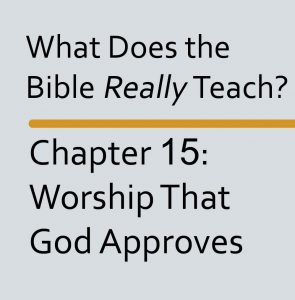“Bible Teach,” Chapter 15, paragraph 5 (p. 146) says there are six features that identify those who practice “the true religion,” so let’s look at each of them in turn.
Feature #1: The Bible
Paragraphs 6-7 (p. 146) say that the first feature it bases its teachings on the Bible, not on human values or tradition: “God’s people today do not teach their own ideas. They believe that the Bible is God’s Word, and they base their teachings firmly on what it says.”
As Christians, we can agree that that is the way things should be, but I would ask the Witnesses several questions:
- Does that mean it is all right for us to question the Watchtower by what the Bible says?
- How can we do this if we can’t understand the Bible without the Watchtower to tell us what it means?
- What about Watchtower errors and doctrinal changes? Should we examine those carefully or ignore them as merely being the mistakes of imperfect men?
This series of questions provides you with an opening to use both The Life and Death Issues Approach and The False Prophecies Approach from my book, Getting Through to Jehovah’s Witnesses: Approaching Bible Discussions in Unexpected Ways.
Feature #2: The name “Jehovah”
Paragraph 8 (p. 148) says that the second feature of the true religion is that “those who practice the true religion worship only Jehovah and make his name known.”
This statement can be a springboard for you to use The Divine Name Approach, especially the section on pp. 218-220 concerning what it means to “make Jehovah’s name known.”
If you deferred an extended discussion of the divine name when the subject was raised in Chapters 1 and 10 of “Bible Teach,” please go back to my post on Chapter 1 and read my additional suggestions for expanding on that topic.
Feature #3: Love, not war
Paragraph 9 (p. 148) says that “God’s people show genuine, unselfish love for one another.” This is violated, the book claims, when people join the military and go to war: “True Christians do not take up weapons to kill their Christian brothers or anyone else.”
You can respond with the section of The Christian Freedom Approach dealing with war and military service (pp. 226-232).
Feature #4: Christ… or an organization?
Paragraph 11 (p. 149) identifies the fourth feature of the true religion is that “true Christians accept Jesus Christ as God’s means of salvation.”
The problem is that the Watchtower believes that people need to come to Jehovah through an organization (the Watchtower Bible and Tract Society) rather than coming to Jesus personally.
Thus, the Watchtower has actually stated that its witness “includes the invitation to come to Jehovah’s organization for salvation.”[i]
You can respond with The Come to Jesus Approach, pp. 81-84, where I deal with how to show Jehovah’s Witnesses that Jesus is the one we need to come to (John 6:67-68), not an organization that claims to represent him.
Feature #5: Neutrality in the world’s affairs
Paragraph 12 (p. 149-150) gives as the fifth feature of the true religion as being that “true worshippers are no part of the world.” It claims that Jehovah’s true followers must “maintain strict neutrality in the world’s political affairs. They take no part in its conflicts.”
The Christian Freedom Approach (pp. 230-232) offers suggestions for discussing with Jehovah’s Witnesses the proper relationship of Christians and secular governments.
Feature #6: Preaching God’s Kingdom
Paragraph 13 (pp. 150-151) identifies the sixth and final feature of the true religion as follows: “Jesus’ true followers preach that God’s Kingdom is mankind’s only hope.”
There are two good ways to respond to this claim.
The first is to say, “I believe the Bible shows that our focus should be on preaching about the King himself, not on prophecies about the coming kingdom.” Follow up with The Come to Jesus Approach.
The second is to point out that “preaching the good news about Jehovah’s Kingdom” doesn’t mean promoting false speculation about when it will come or what will happen when it does. Follow up with The False Prophecies Approach.
Should you become a Jehovah’s Witness?
Paragraph 14 gives a summary that tells you where the book in general and this chapter in particular have been heading:
On the basis of what we have just considered, ask yourself: “What religious group bases all its teachings on the Bible and makes known Jehovah’s name? What group practices godly love, exercises faith in Jesus, is no part of the world, and proclaims that God’s Kingdom is the only real hope for mankind? Of all the religious groups on earth, which one meets all these requirements?” The facts clearly show that it is Jehovah’s Witnesses.
As I can tell you from my own experience, a student who has been studying the book passively—focusing on giving the Watchtower’s answers to the Watchtower’s questions—will find it hard not to come to the Watchtower’s conclusion.
However, you have been studying this book actively, and I hope you will have given the Witnesses cause to seriously question many of the Watchtower’s teachings.
Next week, we will look at the Watchtower’s warning to get out of “Babylon the Great”!
[i] The Watchtower, “Stay Awake and Keep Your Senses,” 11/15/81, p. 21


Leave a Reply
3 Comments on "Six Supposed Features of the True Religion"
I forgot one more:
John 6: 28,29 “Then they said to Him, “What shall we do, that we may work the works of God?”
Jesus answered and said to them, “This is the work of God, that you believe in Him whom He sent.”
Do Jehovah’s Witnesses do this work? Is this what they teach to as the way to eternal life?
They think they are “exercising faith” in Christ’s sacrifice by doing all their Watchtower works.